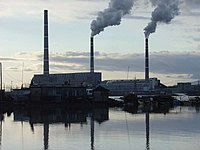
Photo from wikipedia
Abstract Aviation emissions are an important contributor to global climatic change. As growth in travel demand continues to outstrip improvements in the fuel efficiency of air travel, the aviation contribution… Click to show full abstract
Abstract Aviation emissions are an important contributor to global climatic change. As growth in travel demand continues to outstrip improvements in the fuel efficiency of air travel, the aviation contribution to climate change is likely to grow substantially. Consequently, measures that effectively reduce travel demand are required if atmospheric carbon concentrations are to be limited. The efficacy of the Australian Clean Energy Future policy which placed a $23.00AUD (FY 2012) to $24.15 AUD (FY 2013) per tonne levy on carbon-dioxide equivalent emissions from July 2012 to June 2014 is tested. Specifically, time-series regression is used to estimate the effect of this carbon price policy on the level of domestic passenger kilometres flown in Australia, while adjusting for costs of production (i.e. fuel and labour costs), economic activity (i.e. gross domestic product), competitive effects (i.e. airline capacity), and exogenous shocks. There was no evidence that the carbon price reduced the level of domestic aviation in Australia. Carbon pricing measures may have to be levied at a greater rate to affect behavioural change, particularly given the limited potential for future aviation efficiency gains.
Journal Title: Journal of Transport Geography
Year Published: 2018
Link to full text (if available)
Share on Social Media: Sign Up to like & get
recommendations!